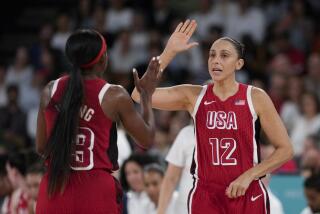It’s Not the Same Old Song and Dance
- Share via
SYDNEY, Australia — Vince Carter dunked, the horn sounded, and suddenly the U.S. basketball players turned and saw something most of them had never seen in their lives.
The New Zealand players who had just lost, 102-56, were crouched at midcourt, shouting and gesturing and stomping their feet in a mesmerizing ritual dance.
“I totally didn’t know what it was,” forward Kevin Garnett said.
It was the haka, a traditional Maori dance more commonly seen at rugby matches, and the Americans loved it, rushing in to high five the New Zealanders when they finished their friendly tribute to the U.S. players and the crowd.
“It’s like a challenge--and also a sign of respect too,” said New Zealand center Peter Pokai, who is of Maori heritage.
“It’s not a war dance, it’s like a challenge. Usually before a game. It’s a sign of respect to your opposition.
“All the Kiwis here would like to do it, but we hear the IOC won’t allow it.”
There goes the IOC, just like the NFL, taking the celebration out of sports.
New Zealand, winless in its first Olympic appearance, wasn’t going to give the U.S. anything like the nine-point game Lithuania managed in the previous outing.
The U.S. shot 60% to New Zealand’s 30%, the lead was 26 at halftime, and the 46-point margin was more of what the crowd of 8,392 expected Saturday at the Dome.
The unexpected came at the end, when the New Zealanders asked the Americans to stay on the court.
“I thought we were about to take a picture. I never saw anything like that in my life,” said forward Antonio McDyess, who scored 15 points behind 18 by Carter and 17 by Allan Houston.
“It was something we wanted to do before the game, but we weren’t sure if it was appropriate or if we were allowed to do it,” said New Zealand center Sean Marks, a former California player who has played for the Toronto Raptors.
“So we decided we’d do it for them after the game, but also for the fans. Unfortunately we haven’t been able to give them a win yet, but maybe that’s coming--so we gave them the haka.”
The traditional haka has an edge of menace and plenty of symbolism.
Pokai squatted and slapped his thighs to demonstrate.
“This means. . . . Well, ah, it’s been a while,” he said.
Garnett didn’t know what it was, but he knew he liked it.
“It’s kind of a neat thing,” he said. “It shows togetherness. I’m a guy that thrives off teamwork, so I thought it was pretty cool--even though I didn’t know what it was.”
Watch much rugby on television and you’ll see the haka, often performed by the All Blacks, as New Zealand’s team is known because of its jerseys.
The basketball team is the Tall Blacks, a nod to the All Blacks, not to race.
Only one team Saturday knew anything about rugby.
“I don’t look at rugby,” guard Tim Hardaway said. “I see it, but I turn the channel. I don’t even understand it.”
What if that had been a rugby match out there?
“Probably the same score you see there. Just reversed,” Marks said.
“Only because they don’t know the rules. If you taught them the rules, they’d be right up there with us. I mean, they’re tremendous athletes.”
More to Read
Go beyond the scoreboard
Get the latest on L.A.'s teams in the daily Sports Report newsletter.
You may occasionally receive promotional content from the Los Angeles Times.






